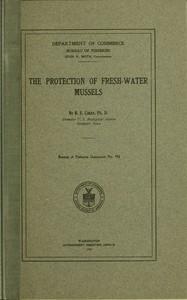|
|
Read this ebook for free! No credit card needed, absolutely nothing to pay.Words: 14271 in 4 pages
This is an ebook sharing website. You can read the uploaded ebooks for free here. No credit cards needed, nothing to pay. If you want to own a digital copy of the ebook, or want to read offline with your favorite ebook-reader, then you can choose to buy and download the ebook.

: The Protection of Fresh-Water Mussels by Coker R E Robert Ervin - Freshwater mussels; Fishery law and legislation United States@FreeBooksWed 07 Jun, 2023 Page Present conditions 3 The mussel industry 3 Depletion of the resources 4 The interests of the community 5 Artificial propagation of mussels by the Government 7 Establishment of propagation 7 Results dependent upon protection 8 Protection 9 Essential considerations for effective legislation 9 Examination of protective measures 10 Two measures for immediate application 10 Measures not suited to existing conditions 10 Size limit--necessity and application 12 Exhaustive nature of the fishery 12 Waste illustrated 13 Size limit in relation to economy 15 Reasons for the proposed 2-inch limit 16 Details essential to effective legislation 17 Closed regions--necessity and application 18 Injury to spawning mussels and to young 18 Considerations determining size of closed regions 19 Practicable division of river systems illustrated 20 Procedure for establishing closed regions 21 Enforcement of the law 22 Summary of recommended legislation 23 THE PROTECTION OF FRESH-WATER MUSSELS. PRESENT CONDITIONS. THE MUSSEL INDUSTRY. The history of the fresh-water mussel industry gives illustration of the promptness with which an American industry may be developed once the pathway is found. Undertaken in a small way scarcely more than a score of years ago, the manufacture of pearl buttons began almost immediately to assume the proportions of an important national industry. As early as 1898, when the enterprise was only 6 years old, there were about 50 factories in more than a dozen towns along the Mississippi. With improved machinery and methods further expansion occurred, until within a few years the output approximated 30 million gross of buttons, with a value of many millions of dollars. The growth of the industry has continued to the present time, but exact figures will not be available until the Bureau has completed a statistical survey now in progress. Not less important has been a resultant economic change, or modification of custom, that has affected practically every person in the country. Where marine pearl was in rare use, fresh-water pearl, with its quality and price, came to fill a universal requirement. In one decade pearl buttons were high in price, used only upon the better clothing, and commonly saved when clothing was discarded, while in the most general use were buttons of metal or agate or wood, which rusted or broke or warped. In the next decade good pearl buttons, neat and durable, were available to everybody and used upon the widest variety of clothing. A former luxury had become a common necessity. Coincident with the rise of the manufacturing industry, there developed an important and widespread fishery, directly employing thousands of persons and indirectly affecting persons and communities of varied occupation. Commencing on the Mississippi River, the fishery gradually spread from stream to stream, passing from depleted territory to new and rich fields, until it embraced practically the entire Mississippi Basin and a portion of the Great Lakes drainage, from Minnesota to Louisiana, north and south, and from Ohio, West Virginia, and Tennessee on the east to Arkansas, Kansas, and South Dakota on the west. DEPLETION OF THE RESOURCES. Extension of territory could not be continued indefinitely. While up to the present time the industry has not failed to obtain shells in quantity sufficient for the market demands, it has become perfectly clear that the perpetuation of the industry as one producing a staple product that is both good and within reach of all people depends upon successful propagation and effective protection. The supply is now maintained by regularly invading new territory , by seeking out the smaller tributaries of the mussel streams, which could not formerly have been worked with profit, and in some measure by the devising of methods that are more effective in capture of mussels. Notwithstanding these developments, all of which indeed conduce to more exhaustive fishery, an increasing proportion of very small shells is being taken, the bottoms are being more thoroughly cleaned, and the price of shell has advanced to a relatively high figure. A high price for shell has, of course, its advantages. It is good for the fishermen, provided they can find the shells, and it stimulates the manufacturers to eliminate waste and to use the most economical methods. On the other hand, if unbalanced by protective restrictions, a continued rise in price is of disastrous consequence. It impoverishes the beds by driving the fishermen to the most exhaustive manner of fishing; even the very smallest shells that can be captured, which should never be removed from the beds, are taken and marketed, and this, unfortunately, is the actual case at the present time. Ultimately the higher price of shell becomes an element in the price of the finished product and is paid by the public at large without corresponding advantage to a single person connected with the industry. Let it be repeated that a high price to the fishermen is desirable, but in the present condition they reap no benefit. A higher price for a disproportionately smaller product brings no added profit. None are so directly interested in the conservation of mussels as the fishermen themselves. Of what advantage is it to the fishermen of the Wabash River, or to the State of Indiana, that shells are now more valuable, when a river that once supported a really important shelling industry is now practically depleted? Wherein is the benefit to Illinois, when only one fisherman can engage in shelling to-day where six worked with profit five years ago? What profit will Arkansas find, when its rivers are now the scene of the most exhaustive mussel fishery ever known and the future is being robbed by the removal of infant shells that are shipped to the markets to be subsequently thrown into the discard by the manufacturers as too small for any useful purpose? Free books android app tbrJar TBR JAR Read Free books online gutenberg More posts by @FreeBooks
: Kingsworth; or The Aim of a Life by Coleridge Christabel R Christabel Rose - England Social life and customs 19th century Fiction; Inheritance and succession Fiction; Cousins Fiction@FreeBooksWed 07 Jun, 2023

: The Swing of the Pendulum by Peard Frances Mary - Man-woman relationships Fiction; British Norway Fiction@FreeBooksWed 07 Jun, 2023
|
Terms of Use Stock Market News! © gutenberg.org.in2025 All Rights reserved.






